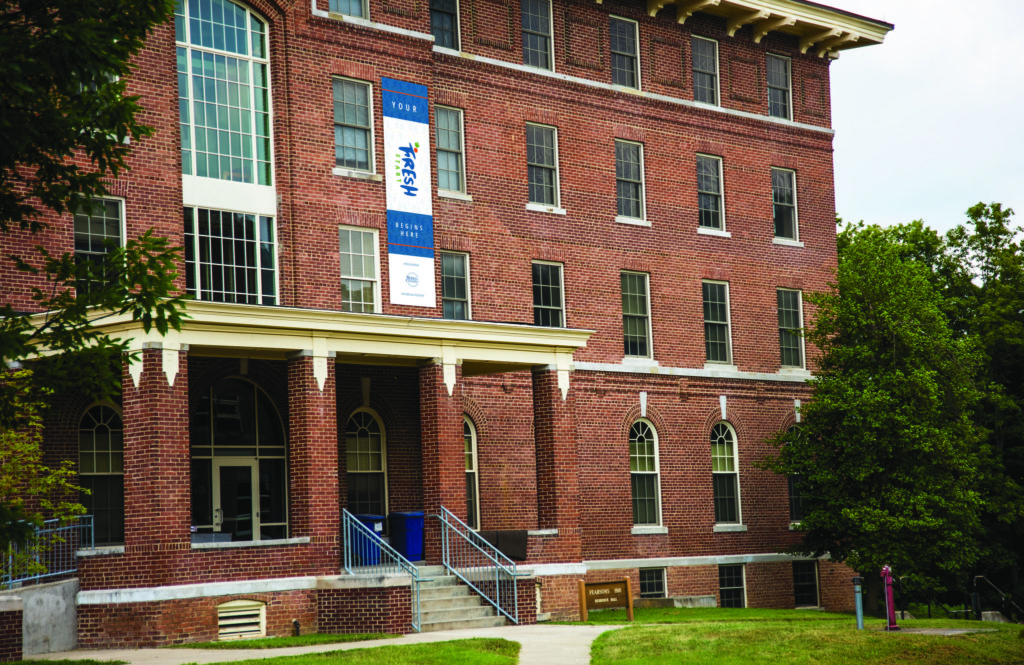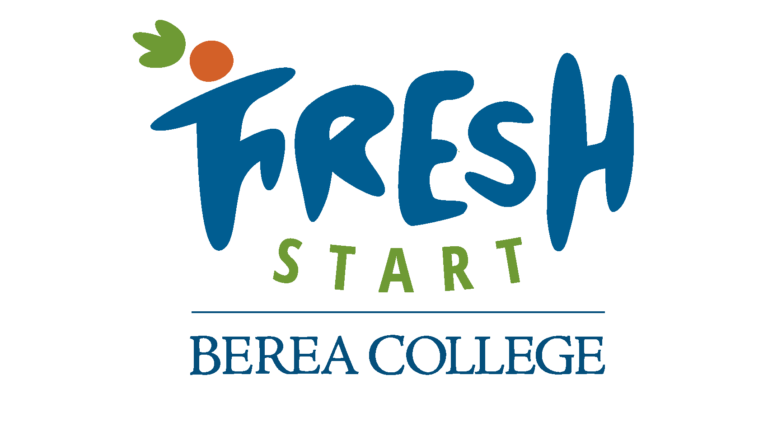It comes as no surprise that at Berea College we emphasize the positive qualities of our students—their outstanding work ethic, strong academic records, and unique personalities. But for more than a century, Berea College has also focused on educating the whole person, including not just enhancing the mind but also working to improve students’ quality of life.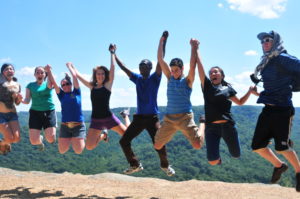 The College, for example, has always concerned itself with spiritual insight and reflection and has long concerned itself with students’ health, offering them balanced nutrition, lessons on hygiene, professional medical and even dental services, and requirements in physical health and swimming competency.
The College, for example, has always concerned itself with spiritual insight and reflection and has long concerned itself with students’ health, offering them balanced nutrition, lessons on hygiene, professional medical and even dental services, and requirements in physical health and swimming competency.
Today, health experts have raised concerns about the health and wellness of college students nationwide and particularly in the region from which Berea admits its majority of students. Central Appalachia and Kentucky are some of the nation’s unhealthiest areas, with high rates of cancer, heart disease, and diabetes. Not all Berea students come to the College unhealthy, of course, but many do. Berea students report substantially higher rates of allergies, back pain, depression, and obesity compared to national college cohorts. Only 8 percent of Berea’s incoming first-year students rate their overall health as excellent, compared to 40 percent of college students nationally.
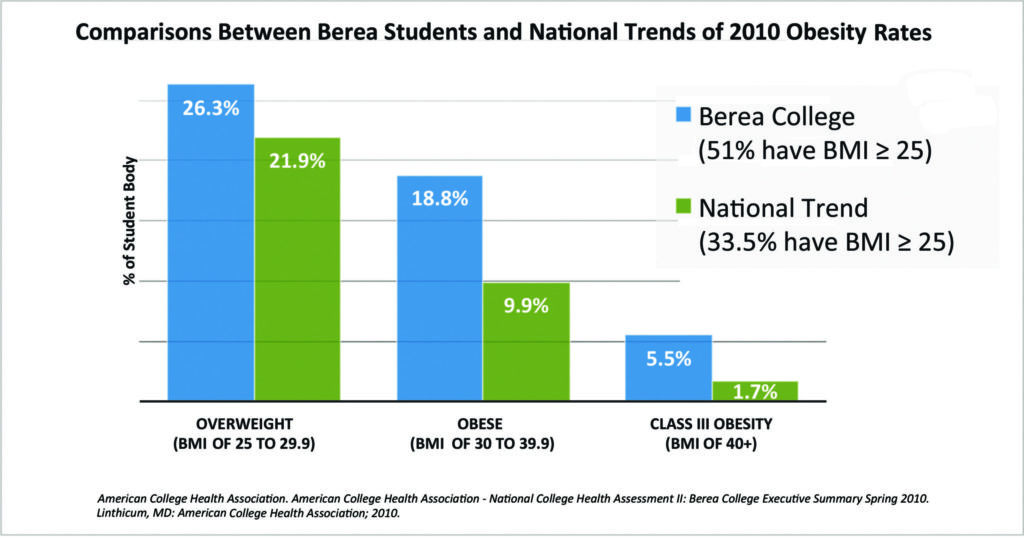
Forty-four percent of Berea’s graduating seniors report that their overall health declined while in college. Data were also examined from the American College Health Association (ACHA) survey, administered in Spring 2010, that indicate only 5 percent of Berea students report eating five or more fruits or vegetables per day; and 50 percent of Berea students do not meet the requirements for aerobic physical activity set forth by the American College of Sports Medicine and the American Heart Association. Comparison data between Berea students and national trends of 2010 obesity rates show higher percentages of overweight and obese students on campus.[text_output]According to Judith Weckman, director of the office of institutional research and assessment, the 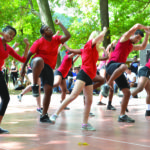 College has gathered data over the past ten years related to health issues such as proper nutrition, exercise, and obesity. Weckman says recently several groups on campus, including faculty, looked at the data and saw connections among physical, mental, emotional, and spiritual health.
College has gathered data over the past ten years related to health issues such as proper nutrition, exercise, and obesity. Weckman says recently several groups on campus, including faculty, looked at the data and saw connections among physical, mental, emotional, and spiritual health.
As concern about these issues grew, efforts to address them focused on developing a comprehensive plan. In January 2013, the College successfully applied for almost $400,000 in external funding to establish a comprehensive wellness program to assess and improve the health and wellness of the College’s students, staff, and faculty.
Such work, after all, is grounded in the Great Commitments. President Lyle Roelofs has often articulated to the College community how the second Great Commitment (“To provide an education of high quality with a liberal arts foundation and outlook”) will not be realized if the College only focuses on the life of the mind and ignores the calls to improve the body and the spirit so that Berea graduates can go out into the world and truly prosper holistically. 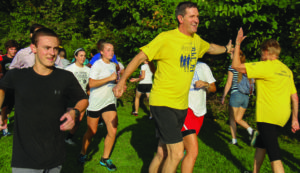 He has also often connected health to the seventh Great Commitment (“To maintain a residential campus and to encourage in all members of the community a way of life characterized by plain living, pride in labor well done, zest for learning, high personal standards, and concern for the welfare of others”), and how curricularly and co-curricularly Berea must teach students how to live healthy lives here in Berea now so that students are prepared for the world that awaits them. And efforts to act on the health reports about citizens in Central Appalachia and the South reflect the College’s eighth Great Commitment (“To serve the Appalachian region primarily through education but also by other appropriate services”). Finally, it is the discomfort associated with the health and wellness of Berea’s students that the community has confirmed from the data already gathered—both when they arrive as well as when they graduate—that has led the institution to an important opportunity to enhance student learning.
He has also often connected health to the seventh Great Commitment (“To maintain a residential campus and to encourage in all members of the community a way of life characterized by plain living, pride in labor well done, zest for learning, high personal standards, and concern for the welfare of others”), and how curricularly and co-curricularly Berea must teach students how to live healthy lives here in Berea now so that students are prepared for the world that awaits them. And efforts to act on the health reports about citizens in Central Appalachia and the South reflect the College’s eighth Great Commitment (“To serve the Appalachian region primarily through education but also by other appropriate services”). Finally, it is the discomfort associated with the health and wellness of Berea’s students that the community has confirmed from the data already gathered—both when they arrive as well as when they graduate—that has led the institution to an important opportunity to enhance student learning.
The chance to do just that came in 2013 when the College began work to develop its Quality Enhancement Plan (QEP), an opportunity of decennial reaffirmation by the Southern Association of Colleges and Schools Commission on Colleges (SACSCOC), Berea’s regional accreditor. A group of faculty, staff, and students eventually came together to look at both external and internal data to formulate a QEP that would deepen student learning and be grounded in Berea’s mission, striving to educate students about health and wellness during their time at Berea so that their lives are healthier beyond Berea.

That group came to three conclusions: that Berea students, based on data, want to improve their health; that although Berea graduates place high importance on developing a healthy lifestyle, data show that there is a substantial gap for how they rate Berea’s effect on this goal; and that although Berea College students are well below public health recommendations on health behaviors such as eating fruits and vegetables, they do express interest, higher than the national averages, in learning about health-promoting behaviors.
What emerged after months of work is FRESH Start. FRESH is an acronym for First-year Residential Experience Supporting Health, a partnership between student life and the academic division that will help first-year students increase personal wellness by learning and practicing strategies supportive of wellness. 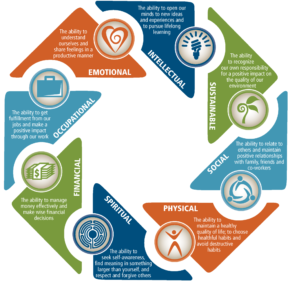 The program will focus on eight dimensions of wellness: physical, emotional, spiritual, financial, intellectual, occupational, social, and sustainable. “We chose to focus on these eight areas to show that wellness is more than physical health and to ensure we would address the whole person,” says Jill Gurtatowski, director of Health and Wellness. There are many elements of FRESH Start, and two aspects, for example, began this fall.
The program will focus on eight dimensions of wellness: physical, emotional, spiritual, financial, intellectual, occupational, social, and sustainable. “We chose to focus on these eight areas to show that wellness is more than physical health and to ensure we would address the whole person,” says Jill Gurtatowski, director of Health and Wellness. There are many elements of FRESH Start, and two aspects, for example, began this fall.
Plotting a New Course
A key component of the College’s current wellness effort is HLT 100: Introduction to Lifetime Wellness, a required general education course intended to help students “improve and maintain wellness in college and after.”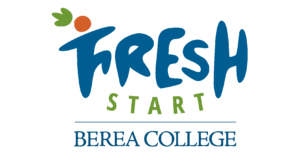 During planning for FRESH Start, the team noted that a half-credit course offering was not sufficient to cover eight facets of wellness, nor was learning in the classroom always being integrated outside it. According to Gus Gerassimedes, assistant vice president for student life, “the intentional partnership between the Health and Human Performance Faculty and Student Life staff will challenge first-year students to adopt and sustain behaviors that reduce health risks, improve quality of life, and enhance personal effectiveness. It’s the right thing to do.”
During planning for FRESH Start, the team noted that a half-credit course offering was not sufficient to cover eight facets of wellness, nor was learning in the classroom always being integrated outside it. According to Gus Gerassimedes, assistant vice president for student life, “the intentional partnership between the Health and Human Performance Faculty and Student Life staff will challenge first-year students to adopt and sustain behaviors that reduce health risks, improve quality of life, and enhance personal effectiveness. It’s the right thing to do.”
A common syllabus has been implemented in all HLT 100 courses this fall that covers topics ranging from fitness and nutrition basics to stress, alcohol, tobacco, and sexual health among others. A variety of student life and even financial aid staff have been complementing classroom learning with co-curricular learning in residence halls. To ensure ongoing communication, those co-curricular staff are sitting in on a section of HLT 100 this fall to learn about the existing course and know more about ways they can supplement student learning.
Over the summer, faculty redesigned HLT 100 into a yearlong wellness course, and once approved by faculty, it will be implemented in the 2016-2017 academic year and be required of all first-year students. The College will assess these courses to determine if efforts are deepening student learning and leading to healthier behaviors as a result.
The Pinnacle Cup Program
The Pinnacle Cup is designed to entice students to practice healthier behaviors and attend a variety of programming events around health and wellness. The program is loosely based on the Oxbridge “House” model. Each first-year residence hall will have an “identity” expressed through a mascot, nickname, and house colors. Students will earn points for themselves and their residence hall by engaging in activities and attending events identified as enhancing their overall wellbeing as framed by the eight dimensions of wellness. In this way, co-curricular learning will complement curricular learning.
Students will have the opportunity to earn points for their house in a variety of ways. Participation in some major campus events, such as Mountain Day, which celebrates nature and the people and culture of Appalachia, will earn points as will taking part in recurring activities such as the President’s Walk/Run Club, which meets every Tuesday and Thursday morning. Events sponsored by the Campus Christian Center, Carter G. Woodson Center for Interracial Education, and others will also earn points. The most important thing, says Gurtatowski, is that the program “remain flexible enough to respond to students’ needs.”[/text_output][text_output]The actual Pinnacle Cup, named after the iconic East and West Pinnacles of Indian Fort Mountain in the Berea College Forest, will be a six-sided wood chalice with each side representing one of the six first-year residence halls. The cup will be will made by students in the Student Crafts program from wood obtained from the College Forest, and it will be awarded at the end of the year to the first-year residence hall with the most cumulative residence hall points.
According to Alicia Klopfer of the Residential Life Collegium, “A major component of the Pinnacle Cup is to heighten a sense of belonging in hall residents to enhance their overall residential experience. Healthy relationships, after all, are a foundation for a healthy lifestyle.”
“I’m very excited about the potential of close collaboration between academic and student affairs,” said Chad Berry, academic vice president and dean of the faculty. “It’s such a great partnership to ensure engaged learning.” By allowing students to explore the dimensions of wellness in both the classroom and their living environments and by applying both life management skills and coping strategies learned in and outside of the classroom, the Berea College Quality Enhancement Plan is designed for first-year students to learn and practice strategies supportive of wellness and understand the nature of stress in all its forms.